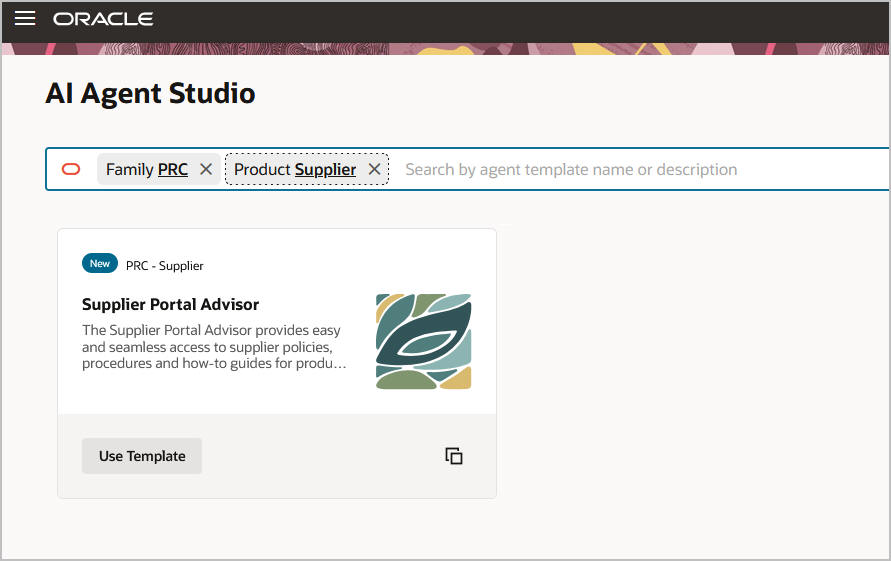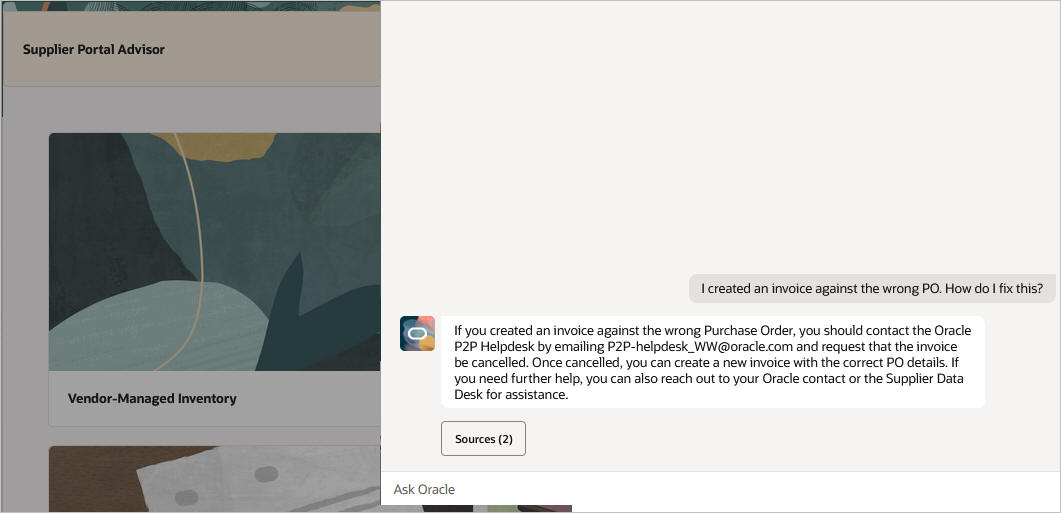AI Agent: Supplier Portal Advisor
Supplier support documentation is often scattered across multiple websites and lengthy files, making it difficult for suppliers to find the information they need to complete transactions in Oracle Supplier Portal. The Supplier Portal Advisor AI Agent helps resolve this by providing a chat-based experience that answers policy, process, and how-to questions directly within the application based on your support content. It also links to documentation when more detail is needed, improving supplier success while reducing the support burden on your team.
The Supplier Portal Advisor is an agent template that you can copy and customize in AI Agent Studio to make changes or even add other agents. This team includes a single agent (Supplier Portal Advisor) that combines:
- a document tool (Supplier Portal Document), where you upload relevant supplier-facing content such as policies, guidelines, and best practices.
- a topic (Supplier Portal Policy), which organizes the source material used to answer supplier questions.
You can upload a wide range of documents tailored to your business and the procure to pay flows you have deployed in Supplier Portal — such as codes of conduct, procedural guides, or invoicing and payment instructions. After the setup is complete, embed the agent into guided journeys on the Supplier Portal pages, enabling suppliers to get answers in context while completing tasks.

Supplier Portal Advisor Template

Supplier Portal Advisor on Supplier Portal homepage
Here's the demo of these capabilities:
Steps to Enable
You can use AI Agent Studio to use or copy a preconfigured agent template to create Agents for your business processes. To automatically add a suffix to all artifacts in your agent team, you can Copy Template instead of Use Template. When you copy a template, you're directly taken to the agent team canvas where you can edit the agent team settings, agents, tools, and topics. The Use Template option takes you through a step-by-step process for configuring each artifact in the agent team.
For information on using AI Agent Studio, see How do I use AI Agent Studio?
Tips And Considerations
- Ensure Allow access for external users is set to Yes when creating a guided journey that uses the Supplier Portal Advisor AI agent. This setting allows you to render the guided journey on Supplier Portal pages.
- Ensure that documents you upload to the Supplier Portal Document tool contain content deemed as suitable to be shared with your supplier representatives, and not considered confidential information that can't be shared with external parties, which would be your suppliers here.
Key Resources
-
For information about using Oracle Visual Builder Studio to extend your Redwood application pages, see Oracle Fusion Cloud HCM and SCM: Extending Redwood Applications for HCM and SCM Using Visual Builder Studio.
-
For more details on enabling external supplier users to access guided journeys, refer to Allow External Users to Access Guided Journeys.
Access Requirements
To access the Oracle AI Agent Studio for Fusion Applications and manage PRC AI agents, users must be assigned a configured job role that contains these duty roles:
- PRC Intelligent Agent Management Duty (ORA_PO_PRC_AI_AGENT_MANAGEMENT_DUTY and ORA_PO_PRC_AI_AGENT_MANAGEMENT_DUTY_HCM – both duty role codes are required)
- Fai Genai Agent PRC Administrator Duty (ORA_DR_FAI_GENERATIVE_AI_AGENT_PRC_ADMINISTRATOR_DUTY)
In the Security Console, filter by Roles and Privileges to find the PRC Intelligent Agent Management Duty role. Filter by Roles and Permission Groups to find the Fai Genai Agent PRC Administrator Duty role.
To interact with AI agents in product pages, users must be assigned a configured job role that contains this duty role:
- Fai Genai Agent Runtime Duty (ORA_DR_FAI_GENERATIVE_AI_AGENT_RUNTIME_DUTY)
In the Security Console, filter by Roles and Permission Groups to find this duty role.
To allow users to interact with agents, you must also enable permission groups in the Security Console on those users’ configured job roles that contain the Fai Genai Agent Runtime Duty role. You can enable permission groups when you manage the basic information of your configured job roles.
Users’ configured job roles must also contain privileges that allow access to the pages where AI agents are enabled.